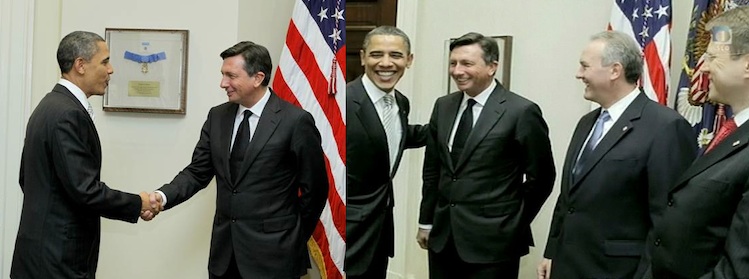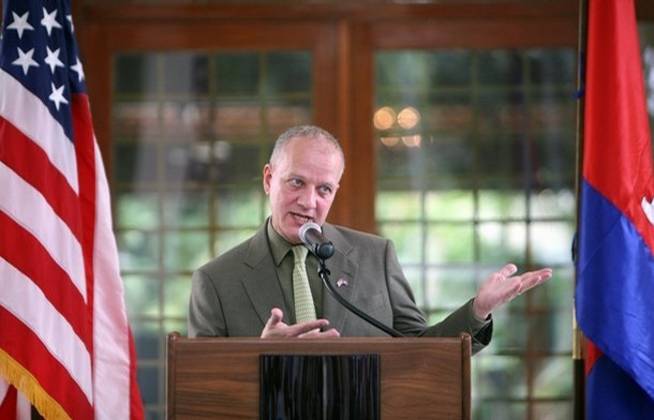Home » Industry Watch » The Technological
Slovenia's Barbie Girl Meets His Ken, Welcomes Gitmo GradsTwenty minutes 'one on one' with Barry: priceless.
Background: Slovenian media began reporting on 28 November that prime minister Borut 'Barbie Girl' Pahor had agreed to accept Gitmo detainees in exchange for a twenty minute meeting with Barack Obama.
The government immediately went out to deny this but the cable 10LJUBLJANA6 said otherwise. The government then denounced the cable.
'There has been no pressure to integrate the prime minister's visit to the US with acceptance of Guantánamo prisoners'.
But PM Pahor did travel to Washington in February to meet with Obama and on 24 February the government passed a new law allowing them to receive the prisoners.
The following is the pertinent section of 10LJUBLJANA6.
1. (C) In a December 30 meeting requested by PM Pahor, CDA and Pahor discussed political and economic priorities for 2010, including the relocation of Guantanamo detainees, stability and integration of the Western Balkans into the EU and NATO, and Westinghouse involvement in the planned second nuclear plant at Krsko. Pahor stated his support for Westinghouse's participation in the replacement of the country's sole nuclear plant, emphasized new taskforces in the MFA and PM's office dedicated to the Western Balkans, and spoke confidently of easy access to Balkan political leaders. In response to CDA's request for assistance in closing Guantanamo, Pahor said that he would ask the government (GoS) to take detainees as long as 'political' and 'financial' obligations were considered separately. In a one-on-one pull-aside with CDA, Pahor linked acceptance of detainees to 'a 20-minute meeting' with POTUS. Pahor also expressed his utmost appreciation for the efforts of the Embassy and the USG in resolving the border dispute between Slovenia and Croatia, and personally thanked CDA for his role. End Summary.
US ambassador Joseph Adamo Mussomeli arrived in Ljubljana in November 2010. The US embassy there hadn't had an ambassador for two years. Mussomeli proclaimed on his arrival: 'finally I'm in a civilised country'. He was interviewed by Zurnal24 when the above story broke. Enjoy. Kudos to Nina for the charm, the footwork, the glamour, the translation.
Q: You've said several times that Guantánamo is primarily the responsibility of the US. So why won't the US take Guantánamo prisoners?
A: You're right! And the majority of Slovenians are right when they say 'you damned americans, Guantánamo is your fault, your responsibility, you have to take care of these people'. But that's not going to happen - at least not in the foreseeable future. President Obama wanted to do that but the US congress passed a law preventing him. So we have a dilemma. Either we leave these people at Guantánamo or we find some other country to take care of them. The followup question is invariably 'why not send them home instead?' But we suspect they'd be imprisoned and tortured, so we can't do that. The congress shouldn't have passed such a law. It's a shameful law. But the president has his hands tied.
Q: But laws can be changed.
A: This law should obviously be changed. But the question is whether it can. Can we get a majority in congress to do that? After 9/11 and with the fear of terrorism, politicians who try that are risking their careers.
Q: So in the meantime you ask us here in Slovenia to amend our own legislation so we can take care of your Guantánamo prisoners. Isn't this a bit hypocritical?
A: Of course it's hypocritical! But I don't care if I can save a Guantánamo prisoner. I'm prepared to be labeled hypocritical, evil, and ugly. I'd even go for friendly and cheesy if it'd rescue someone from Guantánamo. It's important we clean up that prison.
Q: Some Slovenians, even some holding public office, oppose this move. What do you have to say to them?
A: Slovenians are mostly afraid these people are going to be dangerous. They're asking why they should take in these prisoners if the people in the US won't. But it's important to remember that these prisoners in Guantánamo have been carefully selected - very carefully! So we're satisfied they're no threat to your safety.
I can tell you there were two or three Guantánamo detainees interviewed for this, detainees who've expressed a strong interest in coming to Slovenia. who'd be very pleased if they could come here. Any one of them who comes to Slovenia will be coming because they want to come.
Q: Can you tell us more about these prisoners? Who they are? Where they're from?

A: I don't have all the details but I know at least three prisoners have been interviewed. I know one is a construction worker who's been in the business for a long time and another is a halal butcher. So they could both bring important skills to Slovenia.
Q: How many prisoners are you currently detaining in Guantánamo? How many of these can you release?
A: There are three types of prisoners. There's a small group of about sixty we don't know what we can do with. They'd most likely return to terrorism if they were freed. Then there's a group of very simple people - they can't read or write, know nothing about the modern world. Finally there's a third group who are quite educated. They might not be accustomed to the western world but at least they used to live in civilised communities. It's from this group we'd take the prisoners we send to you.
Slovenia's a small country. People will learn very quickly who the former Guantánamo prisoners are, where they live, what they do, whether they're able to live a normal life.
You have a number of muslim communities in Slovenia, a lot of people from Bosnia, Herzegovina, arabs... But I also think people underestimate the Slovenians. I find them to be incredibly open and tolerant. I wasn't expecting this when I transferred here in November 2010. I have a six year old Philippino son - I was warned he might meet prejudice. But this hasn't happened.
Q: Yes but some people might view your son and former Guantánamo prisoners differently. We're already hearing people's reactions. 'They're sending people who once were trained to murder.'
A: I can assure you they won't be sent over if there's any indication they ever murdered anyone. The ones sent would be in that third group - people who found themselves unintentionally involved in war, people such as cooks who needed a job and then got one with al Qaeda or the Taliban, but otherwise had no connection with them.
But what if those groups try to find the prisoners? Or try to force them to return to the war? I can't say there aren't worries here. I can only say we won't release anyone we think is potentially dangerous. But I can't claim with certainty that they wouldn't flee back to Afghanistan.
They'll be supervised the first few months, where they go and what they do, who they visit and how well they integrate into their communities. And of course they'll have to integrate into their communities, not be treated like second class citizens or prisoners.

Q: How are countries who've already accepted Guantánamo prisoners getting on with dealing with them?
A: This varies from country to country. Some simply tell them: 'you're free now - you can go where you want'. Others keep a close eye on them.
I think it's necessary to find a happy medium - not just because of security concerns but because they need help to adapt. So there's a need for help from the government so they find jobs they like and communities to live in.
Q: That's a king size nut!
A: Of course. But the US will be happy to help with those costs.
Q: What does that mean? What costs will you take care of? For how long? Do you cover expenses for all Guantánamo prisoners you send to other countries?
A: This again varies from country to country. Some countries tell us they don't need our financial support, other poorer countries want that support as well as advice on how to handle their situation - they've never done anything like that before. We don't just have financial support, we also have professionals, psychologists, social workers, security guards... They can help with training. We're trying to be adaptable to all possible situations.
Q: How many prisoners will we get if we pass a law to allow this?
A: I think this depends on you. If you - in theory - agree to take one now and then in a year or two - again in theory - agree to take another, then we think that'd be great - and Guantánamo would think so too.
See Also
WikiLeaks: Support WikiLeaks
The Police Protocol (Translated)
Rixstep: Assange/WikiLeaks RSS Feed
Radsoft: Assange/WikiLeaks RSS Feed
|